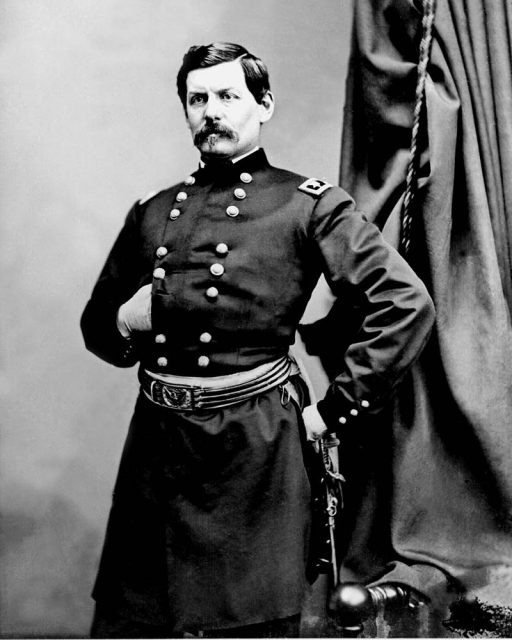
Posted on 01/11/2019 12:10:06 AM PST by vannrox
Late in the afternoon of September 17, roughly an hour before the sunset that would mark the close of the bloodiest day in U.S. history, a Maine regiment met with a wholly unnecessary fate.
Just when the regiments’ soldiers thought they’d made it through the battle relatively unscathed, they got pulled back in with disastrous consequences.
At Antietam, due to Union commander George McClellan’s piecemeal strategy, the fighting was conducted sector by sector. (General Phil Kearny once described McClellan as “fighting by driblets.”) The severe topography of the Antietam Valley, featuring a field carved into discrete sections, contributed further to the situation.

Essentially, the fight shifted over the course of the day, moving from the Cornfield (northern part of the battleground) to the Bloody Lane (center) to the Burnside Bridge (southern section). Although the battle lasted for twelve hours, many soldiers only spent a small portion of that time actively engaged. They fought until the battle died out in their sector, or until their ammo ran out. Then they retreated to safe spots such as a stand of woods, say, or the far side of a hill.
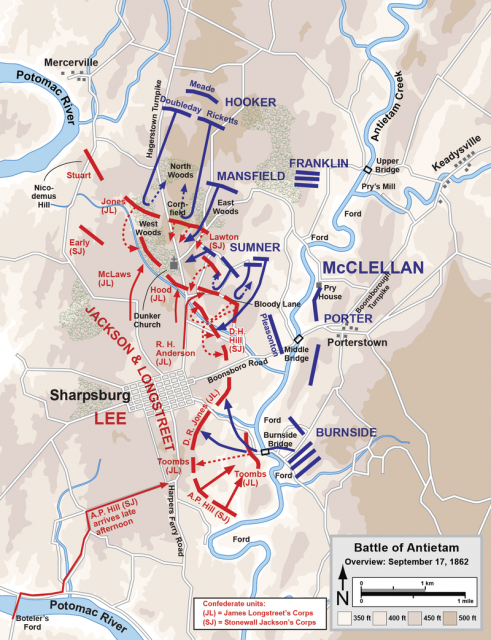
That’s what the men of the 7th Maine believed to be their situation. Back around noon, the regiment had participated in a brief engagement near the Bloody Lane. Afterwards, the soldiers had hunkered down in a choice spot among some boulders, protected from stray shells and shots.
For the past several hours, the Down Easters had been methodically picking off enemy artillerists, and sniping at Rebel officers that wandered into range. They expected that their day was about to come to a close.
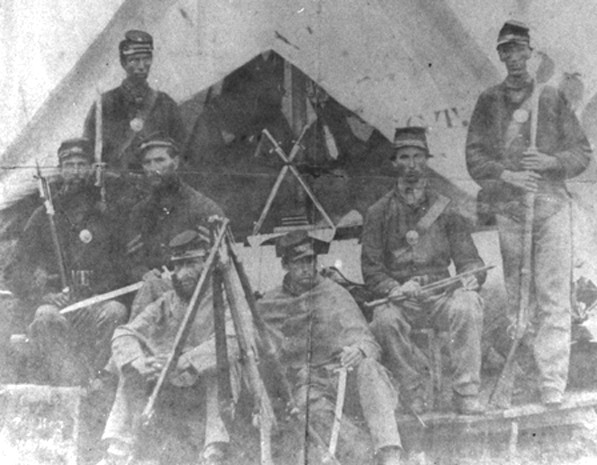
The 7th Maine, composed of soldiers from Augusta and the surrounding area, was mustered into service on August 21, 1861.
But then—seemingly apropos of nothing—Colonel William Irwin, commander of the brigade that included the 7th Maine, demanded that the regiment storm the Piper Farm. This was a spot where Confederates had retreated after being routed at the Bloody Lane. Just as the Maine boys were whiling away the hours in the relative safety of an outcropping of boulders, many Rebels had sought cover on the farm.
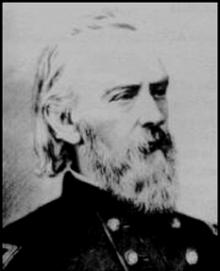
Colonel William Irwin. Caption: A drunken Irwin sent Maine boys to senseless death.
However, this had the potential to be quite a mismatch. The 7th Maine was down to 181 combat-ready men. By contrast, a large number of Confederate soldiers were believed to have fallen back to the Piper Farm.
A heated argument ensued between Colonel Irwin and Major Thomas Hyde. Hyde was 21-years-old, a native of Bath; the 7th Maine, his regiment—he felt a deep responsibility to his boys. The proposed mission was absurd, certain suicide. But Colonel Irwin commanded the entire brigade; he ranked above regimental leader Hyde.
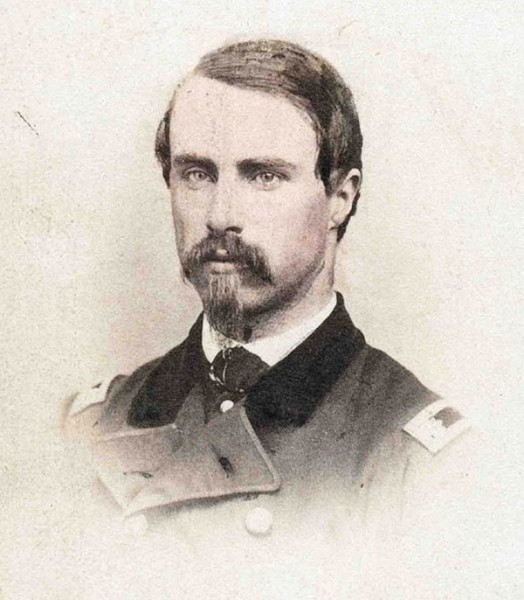
Major Thomas Hyde. Hyde led the 7th Maine at Antietam.
“Colonel,” protested Major Hyde, “I have seen a large force of Rebels go in there, I should think two brigades.”
Irwin insisted, saying, “Are you afraid to go, sir?”
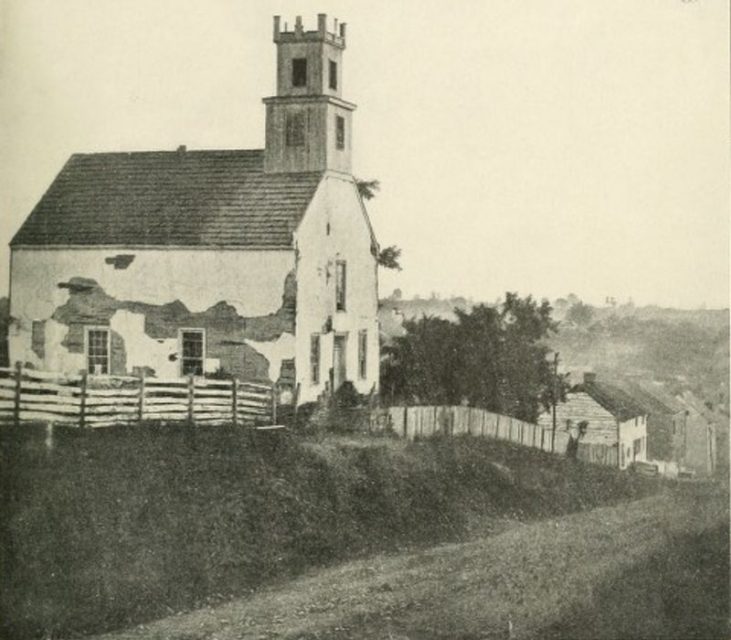
The Lutheran Church just east of Sharpsburg marks the extent of the Union offensive during the Battle of Antietam, 1862. Union skirmishers moved to the cross-street just beyond the church as a Confederate Corps commanded by A.P. Hill arrived on the Shepherdstown Rd., surprising Burnside’s troops and driving them back.
So go they did: 181 men lit off for the farm. Hyde led his men down into and up out of the notorious sunken road that would come to be known as the Bloody Lane. Hyde would recall that it was “so filled with the dead and wounded of the enemy that my horse had to step on them to get over.”
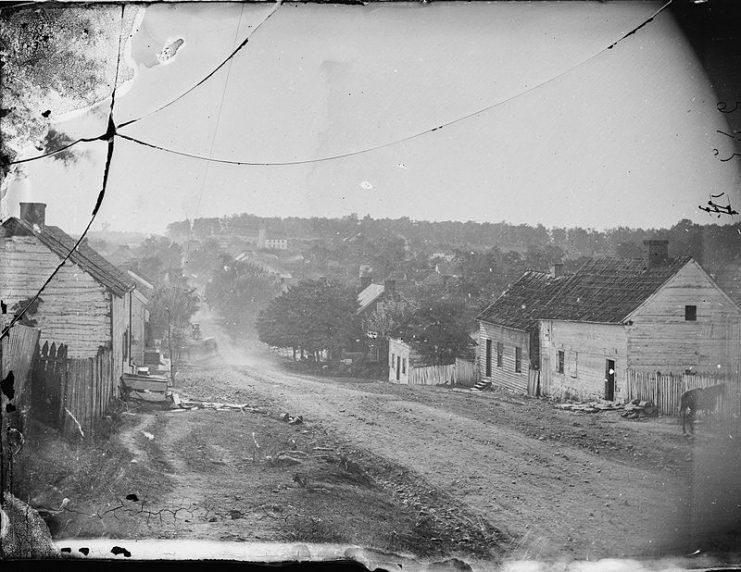
Main Street in Sharpsburg, Maryland, September 1862, after the September 17th Battle of Antietam
Once they’d cleared this grisly impediment, Hyde ordered his men to charge up the gently sloping ground at the edge of the Piper Farm. At this point, the Maine boys encountered their first fire from Rebels hiding behind a stone wall that ran along a portion of the Hagerstown Pike.
As Hyde crested the ridge on horseback, he saw to his horror what awaited his Maine boys on the Piper Farm. The place was crawling with Rebels: Texans, Georgians, Louisianans, and Mississippians—too many to estimate in the moment, certainly enough to dwarf the 7th Maine’s paltry number
Hyde shifted course, leading his men into an apple orchard, a place that might offer some cover. But the orchard turned out to be fenced in on three sides, a fatal trap. The Maine boys fell under fire from muskets and canister. They were driven back against the far fence. William Crosby of the 7th Maine would later write: “bullets, men, and apples were dropping on all sides.”
Major Hyde’s horse was shot in the hip and mouth, and the wounded animal couldn’t jump the fence. Hyde dismounted, and led his boys in a wild dash to safety.
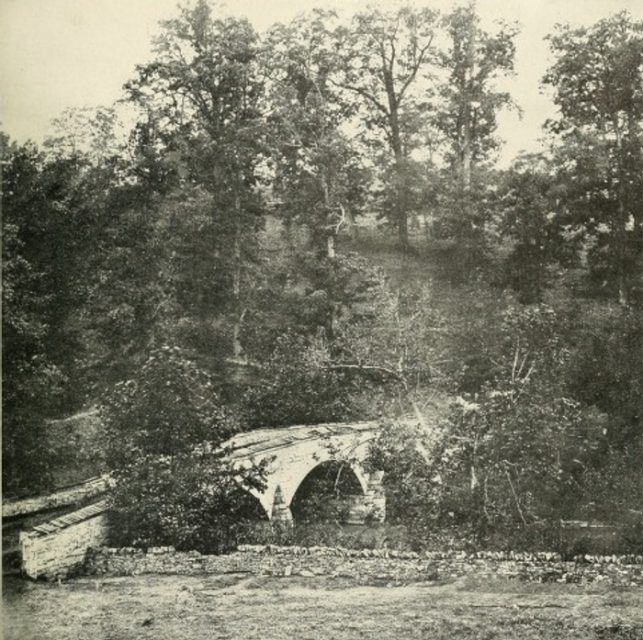
Confederate guns on the hill above poured fire into the Union ranks at Burnside’s bridge. Photo taken just after the Battle of Antietam, 1862.
The 7th Maine retreated back to the same spot from which they’d set out. Only now the regiment was down many men: 12 were dead, 63 injured (another 13 of whom would soon die), and 20 were missing. Major Hyde and the survivors lay on the ground, sobbing like children.
Why this senseless sortie? It turned out that Col. Irwin was driven by nothing more than the “inspiration of John Barleycorn,” as Major Hyde put it. That’s right: late in the day, a drunken commander had sent the Maine boys to their demise, and for nothing.
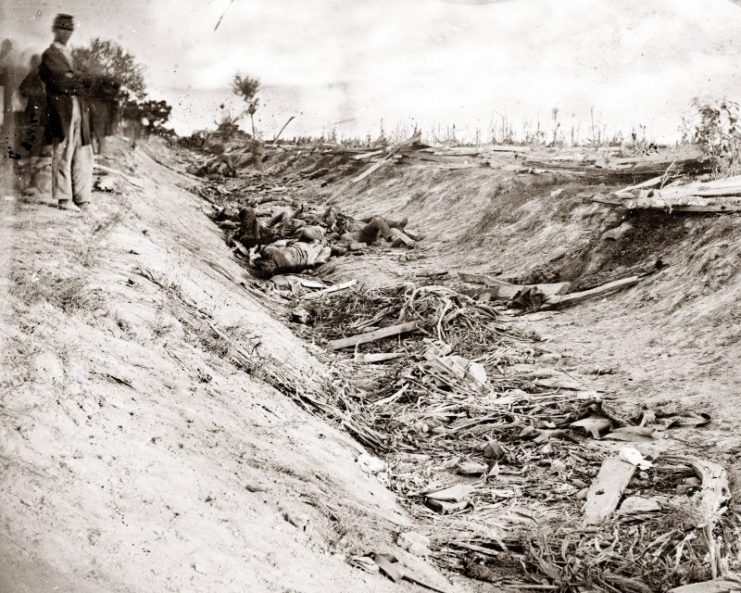
The Down Easters had to march across this grisly sunken road on the way to their own slaughter. (Photo by Alexander Gardner). Library of Congress
This is one in a series of posts, as guest blogger Justin Martin counts down to the September 17 anniversary of Antietam, still America’s bloodiest day.
Martin’s posts will feature little-known episodes he learned about while researching his new book, A Fierce Glory: Antietam—The Desperate Battle That Saved Lincoln and Doomed Slavery (Da Capo Press).
A.P. Hill commanded a division in Jackson’s Wing at the time. He was promoted to Command the III Corp of the Army of Northern Virginia in May 1863.
Thank you for posting this. God bless you and your family.
There was much waste of human life in the Civil War, most of it on the Union side. Look at Burnside’s senseless assaults on Marye’s Heights or the disaster at Cold Harbor.
Horror writ large.
I did a lot of training at Fort A.P. Hill. A lot of training.
“most of it on the Union side.” Franklin, Cemetery Ridge, Malvern Hill. Confederate officers through away the lives of their soldiers just as freely as did Union officers.
The battlefield is amazing. Walked it over the summertime. One second you think you have great cover and concealment, next you are in the complete open. Everyman there who fought thereis a hero in my view.
I knew I’d catch flak about that. But the fact is, Gen Grant knew he could fight a war of attrition and win. And he did just that.
It was a bloody calculus for both sides, but sheer numbers favored the Union.
I’ve never seen that pic of the bridge and hill before
Devastating position for the Federals to bottleneck in
Reminds me of Stirling Bridge
Never have your force use a narrow confined egress to the battlefield if you can help it
You’ll pay for it
In Napoleon theater his adversaries would have either surrendered on the spot or retreated had he occupied that spot in force
That was not the only bridge that was pivotal at Antietam
I’m doing research for a book on the 4th NC Infantry regiment. My great X 3 grandfather fought with the 4th under G B Anderson at Bloody Lane. I think after Anderson was was wounded, his shattered brigades fell back from the lane and parts of it were reorganized by Daniel Harvey Hill for defense at the Piper farm.
Forts Henry and Donaldson were not battles of attrition. Vicksburg was not a campaign of attrition. The battles around Chattanooga were not battles of attrition. All of these victories were won skilled generalship and gained with moderate casualties. Lee lost a higher percentage of his attacking force at Cemetery ridge than Grant did at Cold Harbor. Yet Grant is damned as a cold blooded butcher and Lee is lauded, by some, as the greatest general in U.S. History. Sheer numbers did favor the North. So did the fact that for every cannon cast in the South, the North could cast 10. For every rifle musket made in the South, 20 were made in the North. For every horse the South produced, the North produced 15. For every bushel of wheat produced in the Confederacy, 1000 bushels of wheat were produced in the Union. By every physical metric of war, the North far outclassed the South, in most case considerably. Sheer manpower does not guarantee victory. Every Union General, in almost all cases, had a manpower advantage over his adversary. McClellan, Pope, Burnside, Hooker all had an advantage in manpower over Lee. They lost. Yes Grant had a manpower advantage at the onset of the Overland Campaign, he used that manpower. Within 6 weeks, Lee’s Army of Northern Virginia was penned up in Petersburg like sheep awaiting slaughter. Once that happened, the ANV was on life support, its end was inevitable.
This book is one of the best step-by-step and understandable accounts of the battle that I’ve ever read. ‘Highly-recommended!
Disclaimer: Opinions posted on Free Republic are those of the individual posters and do not necessarily represent the opinion of Free Republic or its management. All materials posted herein are protected by copyright law and the exemption for fair use of copyrighted works.